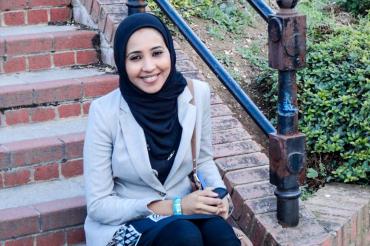With a focus on education and technology, U of T PhD candidate Mai Ali aims to help others

Published: September 21, 2021
Mai Ali still remembers the feeling of holding her first cell phone back in the early 2000s.
“The idea that this small, handheld device could connect me to my aunt who lived on another continent, more than a thousand miles away from where I was in Khartoum, was amazing,” says Ali, a PhD candidate in the University of Toronto’s Edward S. Rogers department of electrical and computer engineering in the Faculty of Applied Science & Engineering. “I knew I wanted to build technologies that could have that kind of impact.”
Two decades later, Ali’s journey has brought her halfway around the world to U of T, where she earned one of the first Indigenous and Black Engineering and Technology (IBET) Momentum Fellowships alongside D’Andre Wilson-Ihejirika, a PhD candidate in chemical engineering and the Institute for Studies in Transdisciplinary Engineering Education & Practice (ISTEP).
The fellowships provide support and build a network for Indigenous and Black graduate students – groups that are underrepresented in both academia and the engineering profession. Recipients receive financial support, mentorship, training and networking opportunities to foster a robust professional community for participating PhD candidates.
Writer Tyler Irving recently spoke with Ali about what she hopes to accomplish in the next few years.
How did you discover that engineering was for you?
My family comes from Sudan and they are mostly in the medical field. My mom is an ophthalmologist and my dad was a pharmacist. Although he is no longer with us today to see me starting my graduate studies journey, all the success and honour I’m encountering on this journey is dedicated to him.
I was fascinated by the telecommunications revolution that took place in the early 2000s and the impact it could have on communities.
I did my undergraduate studies in electrical engineering at the University of Khartoum. From there I went to the American University of Sharjah, in the United Arab Emirates, where I researched radio-frequency integrated circuit design. Specifically, I was interested in systems that can harvest wireless energy in order to power small sensors, thus making them energy autonomous.
For my master’s thesis, I designed a low-energy implantable glucose monitoring system that could be powered by Bluetooth technology. This would provide a new way for patients with diabetes or other conditions to track their blood glucose levels – one that is a lot less invasive than the finger-prick tests that are commonly used today.
Can you tell me about the research you’re planning to do at U of T?
I want to continue my work in smart, autonomously powered sensors – especially for medical applications.
For example, you could imagine an elderly patient equipped with a glucose sensor, heart rate monitor, blood pressure sensor, etc., all connected to a smart gateway within the patient’s home. Caregivers or family members would instantly be notified if something went wrong, which could allow people to stay in their homes longer before needing to go into a long-term care facility.
What does the IBET Momentum Scholarship mean to you?
Earlier this year, I started an initiative called AI101 that aims to bring world-class education in artificial intelligence, machine learning and data science to the less privileged students in Africa for free.
This fellowship makes me feel like my efforts to help others are being appreciated. Receiving a graduate degree and, hopefully, becoming a professor would put me in a position where I can further help people. The IBET Momentum Fellowship is a great initiative and I feel very honoured and privileged to be selected for it. I hope I can achieve the goals that led to its creation.



